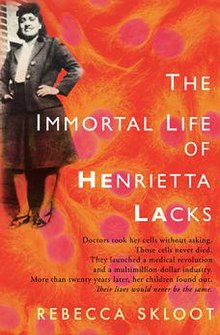Random House Teachers Guide Henrietta Lacks
For Instructors Instructors may wish to use the Random House study guide for class discussions. While designed for high school students, the chapter by chapter discussion questions provide an excellent resource for UNIV 100 classes. Other guides are also included below. Discussion Questions and Resources.
(Random House) The Immortal Life of Henrietta Lacks contains three main narratives, each with unique applications to the disciplines of language arts, history, and science. As a result, this guide is structured to provide discussion and writing activities that will engage students in researching, reading, and writing across the curriculum. (Rebecca Skloot) A reader's guide to The Immortal Life of Henrietta Lacks provided on the author's website.
(North Carolina State University) Discussion questions created by NC State for incoming students for their 2011 Common Reading of The Immortal Life of Henrietta Lacks. (UW-Madison) Discussion questions created by UW-Madison for incoming students for their 2010-2011 Common Book Program of The Immortal Life of Henrietta Lacks. Questions here are grouped somewhat thematically.

Big-picture questions. (UT Health Center) Discussion questions created by the University of Texas Health Center One Community/One Book selection of The Immortal Life of Henrietta Lacks.
Henrietta Lacks House
Many of the questions here are health and science-based. (NCI-Frederick) General discussion questions from the Scientific Library at NCI-Frederick. Medical focus. (Book Lust) Discussion questions created for a book group. (North Carolina A& T State University ) Discussion questions created for a book group.
- Oct 24, 2017 - Here are some topic ideas to research related to Henrietta Lacks. Random House Teachers Guide Teaching Guide -- discussion guide,.
- Random House cademc Resources 1745 Broada e ork 10019. Teacher’s Guide CD COMMON CORE STATE. Author ofThe Immortal Life of Henrietta Lacks.
(Tulane University ) Discussion questions taken from Skloot's website, but an additional resource. Project Ideas and Unit Plans. (Charles H. Settles) In this course, students will learn to decenter the power of white privilege to stand absolute by critiquing its dominance (Collins 1986, 1991, & 1998; Feagin et al., 1996).
This is the Teacher's Guide for Headstrong by Rachel Swaby. Many of the women profiled in the book operated as outsiders – lacking the. The White House's Women in STEM page: Amy Jurskis is the author of a number of teaching guides, including The Immortal Life of Henrietta Lacks.
In constructing this decentering critical sociology of health disparities, students will challenge reified power relations or what they have been previously and unquestioningly taken-for-granted, and replace them with some alternative knowledge or thinking (Collins 1998; Wolff 1976 & 1983). Includes an interactive read aloud of The Immortal Life of Henrietta Lacks. See links below for reading strategies referenced.
Reading and Writing Strategies. (Kathy G. Short via University of Arizona) See Creating Classrooms for Authors and Inquirers, Kathy G. Short and Jerome Harste, Heinemann, 1996. Helpful resource for reading strategies to use in the classroom. (Northwest Association for Biomedical Research) The National Paideia Center, which has developed extensive materials on using seminars in classrooms, defines a Socratic seminar as a ‘collaborative, intellectual dialogue facilitated with open-ended questions about a text.’. (Read Write Think) This strategy guide explains Socratic seminars and offers practical methods for applying the approach in your classroom to help students investigate multiple perspectives in a text.
(Karla Huntsman) Process drama is a specific form of drama particularly suited to engaging students deeply in whatever subject is being taught. The following tools can be used singly to make a lesson plan more meaningful or in various combinations to form a complete process drama exploration. (SDCOE) 'Philosophical Chairs' is a technique to allow students to critically think, verbally ponder and logically write their beliefs. Social Media and Multimedia in the Classroom. (MindShift KQED) Using, a group of 12 of Klein’s students researched historical documents, took on a historical character, and Tweeted their actions to create a month-long this May. (Jeopardy Labs) Allows teams of students to answer questions about the text in a Jeopardy-style game. Also provides a blank template to create your own Jeopardy game.
Service Learning and Social Justice. (In development).